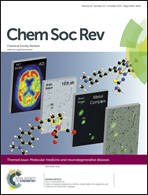PET/SPECT imaging agents for neurodegenerative diseases
Abstract
Single photon emission computed tomography (SPECT) or positron emission computed tomography (PET) imaging agents for neurodegenerative diseases have a significant impact on clinical diagnosis and patient care. The examples of Parkinson's Disease (PD) and Alzheimer's Disease (AD) imaging agents described in this paper provide a general view on how imaging agents, i.e. radioactive drugs, are selected, chemically prepared and applied in humans. Imaging the living human brain can provide unique information on the pathology and progression of neurodegenerative diseases, such as AD and PD. The imaging method will also facilitate preclinical and clinical trials of new drugs offering specific information related to drug binding sites in the brain. In the future, chemists will continue to play important roles in identifying specific targets, synthesizing target-specific probes for screening and ultimately testing them by in vitro and in vivo assays.

- This article is part of the themed collection: Molecular Medicine and Neurodegenerative Diseases

 Please wait while we load your content...
Please wait while we load your content...